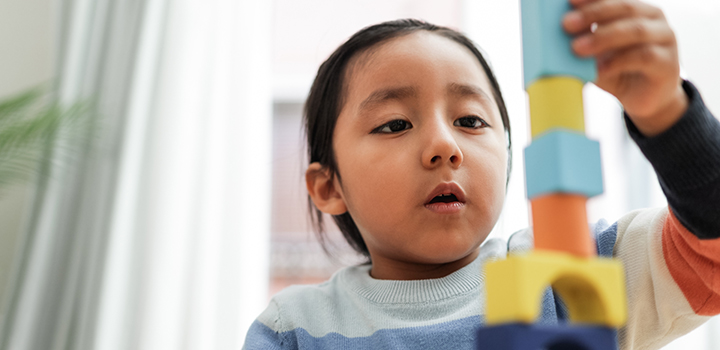UEA tracks baby brainwaves to give deaf infants a head start
By: Communications

A major new effort is underway at the University of East Anglia to help deaf children born to hearing parents gain stronger language skills from the very start.
Researchers are exploring how limited access to language in early childhood affects development - and how to better support families during this critical period.
At just 19 months old, baby Colton is one of the first to take part in the project. He was born deaf to hearing parents Clodagh and Munro, from Ireland.
Now, the team are looking for more hearing families with deaf babies under one to take part.
Lead researcher Prof Teodora Gliga, from UEA’s School of Psychology, said: “Because of varying language experiences, many deaf children with hearing parents enter school with delayed language skills and learning gaps.
“We want to change that trajectory by working directly with deaf babies and toddlers to track how early language access - or the lack of it - shapes cognitive growth during the first two years of life.
Colton’s mum Clodagh, said: “We know that Colton has limitless potential, and we want to give him every opportunity to thrive.
“We are constantly learning, and we are always hunting for every possible advantage. These types of studies give us valuable information and tools - to give Colton the best start and to support him in every way we can on his own journey.”
£1 million project
It is hoped that the £1 million project, funded by the Economic and Social Research Council, will help improve support for deaf children and their families from day one.
Prof Gliga said: “One child in every 1,000 is born deaf, and the vast majority of these children are born to hearing parents.
“Most hearing parents use spoken language as their primary language which is at least partially inaccessible to their deaf child. Deaf parents however use sign language, which is fully accessible to the child.
“Many deaf infants born to hearing parents will experience reduced access to the main language used by their family.
“We want to better understand the large variation in communicative development and school-readiness of deaf children born to hearing parents.”
What the research looks like
Babies taking part in the project will be fitted with a special cap of neuroimaging sensors that will detect their brainwaves as they are shown images of familiar and non-familiar objects. Meanwhile, an eye-tracking device will monitor exactly where they are looking.
“Another important aspect of the project will be to characterise the impact that using sign language has on early learning,” said Prof Gliga.
“Some hearing parents of deaf children learn sign language, but it may take time for them to reach the fluency required for conversation.
“But even signing with lower proficiency may support the learning of categories and this may explain why deaf children that have some sign language exposure tend to fare better academically,” she added.
To find out more or take part, contact child.scientist@uea.ac.uk.
Related Articles

How talking to toddlers boosts early brain development
Talking to toddlers helps shape their developing brain, according to new research from the University of East Anglia.
Read more
Research shows why some children may be slower to learn words
New research from University of East Anglia reveals why some children may be slower to learn words than others.
Read more
Poor air quality linked to cognitive problems in babies
Poor air quality could be causing cognitive deficits in babies and toddlers, according to new research from the University of East Anglia.
Read more